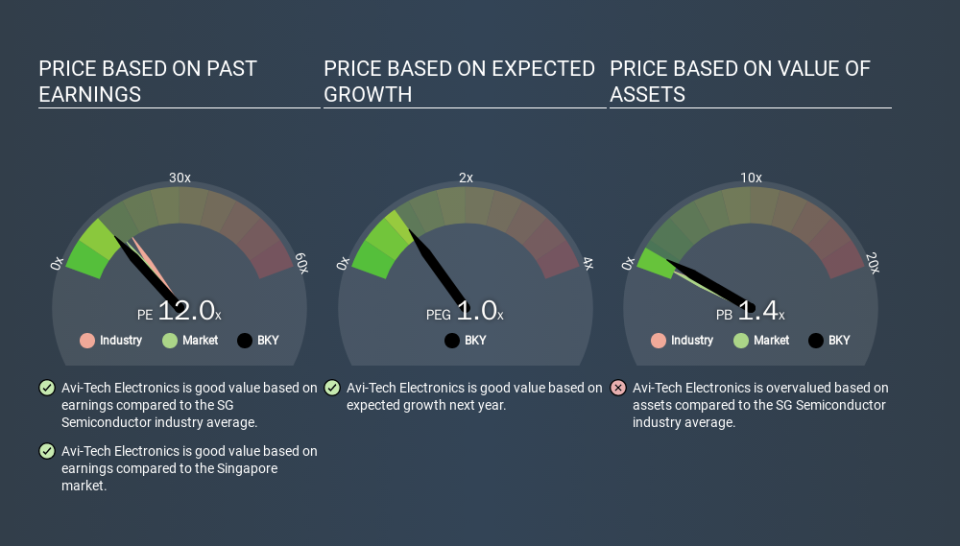Is Avi-Tech Electronics Limited's (SGX:BKY) P/E Ratio Really That Good?

Today, we'll introduce the concept of the P/E ratio for those who are learning about investing. We'll look at Avi-Tech Electronics Limited's (SGX:BKY) P/E ratio and reflect on what it tells us about the company's share price. Avi-Tech Electronics has a P/E ratio of 11.95, based on the last twelve months. In other words, at today's prices, investors are paying SGD11.95 for every SGD1 in prior year profit.
View our latest analysis for Avi-Tech Electronics
How Do I Calculate A Price To Earnings Ratio?
The formula for P/E is:
Price to Earnings Ratio = Share Price ÷ Earnings per Share (EPS)
Or for Avi-Tech Electronics:
P/E of 11.95 = SGD0.41 ÷ SGD0.03 (Based on the trailing twelve months to December 2019.)
Is A High P/E Ratio Good?
The higher the P/E ratio, the higher the price tag of a business, relative to its trailing earnings. That is not a good or a bad thing per se, but a high P/E does imply buyers are optimistic about the future.
Does Avi-Tech Electronics Have A Relatively High Or Low P/E For Its Industry?
We can get an indication of market expectations by looking at the P/E ratio. We can see in the image below that the average P/E (15.5) for companies in the semiconductor industry is higher than Avi-Tech Electronics's P/E.
This suggests that market participants think Avi-Tech Electronics will underperform other companies in its industry. Many investors like to buy stocks when the market is pessimistic about their prospects. It is arguably worth checking if insiders are buying shares, because that might imply they believe the stock is undervalued.
How Growth Rates Impact P/E Ratios
Companies that shrink earnings per share quickly will rapidly decrease the 'E' in the equation. That means even if the current P/E is low, it will increase over time if the share price stays flat. Then, a higher P/E might scare off shareholders, pushing the share price down.
Avi-Tech Electronics's earnings made like a rocket, taking off 80% last year. The cherry on top is that the five year growth rate was an impressive 36% per year. So I'd be surprised if the P/E ratio was not above average.
A Limitation: P/E Ratios Ignore Debt and Cash In The Bank
Don't forget that the P/E ratio considers market capitalization. So it won't reflect the advantage of cash, or disadvantage of debt. Hypothetically, a company could reduce its future P/E ratio by spending its cash (or taking on debt) to achieve higher earnings.
While growth expenditure doesn't always pay off, the point is that it is a good option to have; but one that the P/E ratio ignores.
Is Debt Impacting Avi-Tech Electronics's P/E?
With net cash of S$36m, Avi-Tech Electronics has a very strong balance sheet, which may be important for its business. Having said that, at 48% of its market capitalization the cash hoard would contribute towards a higher P/E ratio.
The Bottom Line On Avi-Tech Electronics's P/E Ratio
Avi-Tech Electronics has a P/E of 12.0. That's below the average in the SG market, which is 13.5. Not only should the net cash position reduce risk, but the recent growth has been impressive. The below average P/E ratio suggests that market participants don't believe the strong growth will continue.
Investors should be looking to buy stocks that the market is wrong about. As value investor Benjamin Graham famously said, 'In the short run, the market is a voting machine but in the long run, it is a weighing machine. So this free visual report on analyst forecasts could hold the key to an excellent investment decision.
Of course you might be able to find a better stock than Avi-Tech Electronics. So you may wish to see this free collection of other companies that have grown earnings strongly.
If you spot an error that warrants correction, please contact the editor at editorial-team@simplywallst.com. This article by Simply Wall St is general in nature. It does not constitute a recommendation to buy or sell any stock, and does not take account of your objectives, or your financial situation. Simply Wall St has no position in the stocks mentioned.
We aim to bring you long-term focused research analysis driven by fundamental data. Note that our analysis may not factor in the latest price-sensitive company announcements or qualitative material. Thank you for reading.

